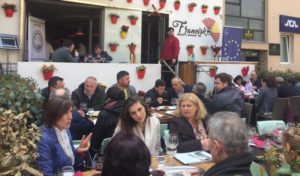Until December 2016, an overall of 182 million euro was invested in Kosovo from outside the country, a decrease of 32 percent compared to the previous year.
An investments decrease, according to the Central Bank of the Republic of Kosovo, was observed in the sectors of real estate, construction, and financial services.
On the other side, until June 2016, the biggest capital was invested by Switzerland, Turkey, Albania, and Austria…, emphasizes a report of the Central Bank of the Republic of Kosovo.
Even though there are no statistics for direct foreign investments for the first half of 2017, what is noticeable is that they are mainly individual initiatives for small businesses and are mainly in the biggest urban centers.
A foreigner who has made Prishtina his home, the Spanish Francisko, opened his restaurant three years ago in one of the most frequented streets of the capital – known as “small coffee shops street.”
A lawyer by profession, Francisko today has one of the most well-known restaurants in Prishtina. He says that the society influenced his decision to participate in the cooking competition “MasterChef Albania.”
After the end of the competition, he decided to open his first restaurant in Albania, but adds that his first idea was to open a restaurant in Kosovo. He achieved this after a year.
“I had no difficulties regarding administrative issues. These things function very well in Kosovo. In Albania it is a real mess, at least during the time I was there,” he told KosovaLive.
Francisko says that initially, he had problems with employees, specifically chefs. Consequently, he was forced to employ chefs from Albania.
Currently, the restaurant has 7 employees. He is proud that in his restaurant foods are only prepared based on his original recipes. However, he noticed that Kosovo is lacking a professional catering school. For this reason, he is planning to open a professional catering school. He is aware that it is a huge investment, and he expects help from the Government of Kosovo.
“Catering has a lot of importance in the development of tourism since it is one of the main things that remain on tourists’ mind during their journeys.”
After three years in Kosovo, he also managed to open a second business.
“I’m also a wine exporter. I have imported over 10 thousand bottles of Spanish vine. All customs procedures have been very quick and went quite well. We did not have any problems,” he asserts.
Francisko is not just a good chef and businessman. He has his permanent clientele and is in love with Kosovo. For this reason, it is not difficult for him to lobby in his country, Spain, for the recognition of Kosovo as an independent country.
“I promote Kosovo a lot. I did some interviews on some very prestigious television shows and in magazines in Spain. I even had complaints that they did not recognize Kosovo as a country. The fact that Kosovo is independent is an unquestionable fact,” he declared for KosovaLive.
However, he thinks that Kosovo should invest more in education, since, as he says, “without education, there will not be neither health nor adequate services.”
As for foreign investments, like his restaurant, he considers that it is a very good opportunity that citizens of Kosovo get acquainted with other cultures, and there is also a contribution to the economic development.
Francisko is not the only owner of a small business in Prishtina.
Chelsea Charles left Texas in the United States of America to live in Kosovo. She came here six years ago to do a research for a Non-Governmental organization, but only three months later she moved here.
She started her business, the hostel named “Buffalo Backpackers.”
Charles says she was very enthusiastic to start her business. Initially, she only helped internationals as a guide during their visits to Kosovo. After this, between working in the NGO and tourism, she chose to work on tourism, what she does today as well. It is more than a full-time job for her, since running a business keeps her busy all the time, but she thinks it is worth helping this country.
“It was easy starting the business regarding documents, but there are several challenges after that. Also, running a business on your own means learning a lot of new things every day and never stopping,” Chelsea says.
Small businesses bring small profit, she says, and adds that this has to do more with the passion you have for work than the money.
She has two employees but also has volunteers who help her in small things. During these six years, guests from almost all the world have stayed at her hostel: North America, Europe, Asia and the Balkans.
“I’m planning to live in Kosovo. I’m in the process of getting citizenship in Kosovo. I want to do more regarding opening small businesses, something that would help the economy,” she says.
Another wish of hers is to become the voice of women, that all those who have ideas and business plans are able to start their businesses. Also, she wants to lobby for more gender equality in the workplace.
“I am a girl who loves Kosovo. This country is my priority in life,” she says.
According to the Kosovo Agency of Statistics, compared to 2015, in which 46 small companies with international owners were opened, there has been a slight increase of foreign investments in 2016. In 2017, 52 small businesses have been registered with international owners and 642 businesses with two or more owners, one of them international.
Shqipdona Ademaj








